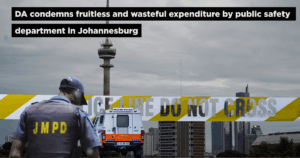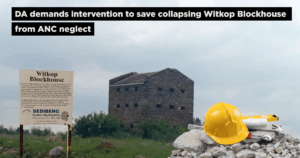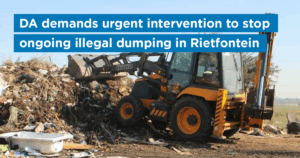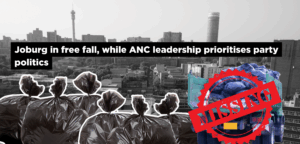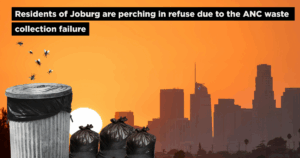The Democratic Alliance (DA) in Tshwane welcomes the arrest of three suspects attempting to vandalise the Faerie Glen substation, by the South African Police Service (SAPS).
DA councillor Malcolm de Klerk, standing in for Christo van den Heever, informed me of the arrest on Friday night.
Earlier this year Tshwane was not so lucky: a brand new pumpstation that had been championed by councillor Shane Maas, to relieve constant water interruptions in Waterkloof and surrounds was vandalised.
The vandalism of electricity infrastructure is one of the major causes for prolonged and persistent power outages. Over 720 meters of cable was stolen last Saturday in Ward 82. It has become clear that this was a carefully planned theft. It took place under the bridge at the Garsfontein road and N1 interchange, impacting large swathes of Tshwane, especially the surrounding businesses.
Every time extensive damage is done to substations, it weakens the overall reticulation network. The same is true of water and sanitation installations.
These attacks also deplete city wide repairs and maintenance budgets. Every rand spent on repair is one not spent on maintenance. And so, assets deteriorate.
While the action of the Faerie Glen SAPS must be commended, it is critical that the City of Tshwane takes every possible step to close the enormous security gap at service installations.
The model of simply deploying stationary guards is not only ineffective, but also expensive. It is critical that technology, including basics such as cameras, motion detectors, and control rooms be used as is the norm in the private sector.
Under Executive Mayor Cilliers Brink, the DA and our coalition partners commissioned a study of the city’s security needs with a view to implement private sector practices in securing especially electricity substations.
One possible solution was to contract local security companies that already have a footprint in communities, and whose reputation can be validated, to safeguard municipal infrastructure.
While such a solution is bound to be opposed by security companies offering guarding services to municipalities and state entities at exorbitant costs, the truth is that only a fraction of service installations are secured at present.
Moreover, Tshwane receives constant complaints that these security companies do not pay their guards.
This leads to never-ending and completely unaffordable demands for guards to be ‘insourced’ at taxpayers’ expense, but without any prospect of better security.
Tshwane and other metros must find a way of getting more bang for the taxpayers’ buck.
The DA will be writing to the municipal administration to ask whether the security study we commissioned has been completed, and if so, when the recommendations will be implemented.
One thing is sure: simply renewing the current guarding services contracts is the worst possible option.


